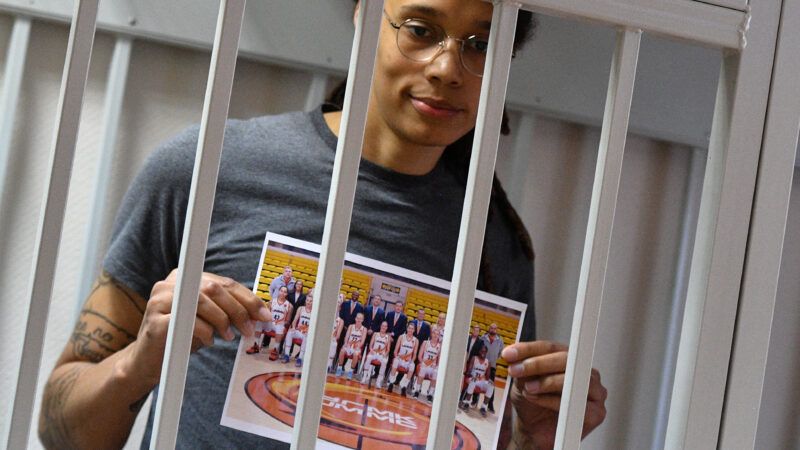Brittney Griner's 9.5-Year Sentence Is Harsh Even by Russian Standards
It is unclear if, or when, she could be freed by a prisoner exchange.

Brittney Griner was sentenced to 9.5 years in a Russian penal colony on Thursday. The WNBA player was detained on February 17 after officials reportedly found hashish oil cartridges and vape pens in her luggage while traveling through a Moscow airport. Griner's lawyers announced that they would appeal her sentence.
"This [verdict] contradicts the existing legal practice. Taking into account the amount of the substance (not to mention the defects of the expertise) and the plea, the verdict is unreasonable," Griner's lawyers said in a statement obtained by CNN. "We will certainly file an appeal."
Griner's arrest was likely politically motivated, and her unusually long sentence may be as well. Despite Griner's relatively minor offense, she received a far longer sentence than other Russian offenders, only a few months from the maximum possible sentence of 10 years. Griner's lawyers have expressed disappointment and outrage over the sentence, noting that the average sentence for low-level drug possession in Russia is around five years, not nine.
"As legal professionals, we believe that the court should be fair to everyone regardless of nationality," they said. "The court completely ignored all the evidence of the defense, and most importantly, the guilty plea."
Whether Griner will spend over nine years in a prison camp or be home with her family in a few months is unclear. What is clear is that Russia's likely politically motivated arrest and imprisonment of a prominent American athlete is having its intended effect—she is the perfect bargaining chip to secure the release of Russians held in U.S. prisons.
The Biden administration declared Griner "wrongfully detained" in May and announced their offer of a prisoner exchange in July. According to CNN, U.S. officials offered to release weapons trafficker Viktor Bout in exchange for Griner and Paul Whelan, another U.S. citizen imprisoned in Russia since 2018 on espionage charges. However, according to Bloomberg, Russian officials are unlikely to agree to an offer unless they can secure the release of two Russian prisoners.
Further, Russian officials have warned the Biden administration against public discussion of prisoner exchange offers. "They have decided for some reason to solve these problems by the megaphone method. This is not how they are solved," Kremlin spokesman Dmitry Peskov said in Moscow. "These swaps will never happen if we start discussing any nuances of the exchange in the press." Friday morning, U.S. and Russian diplomats announced their intention to begin more formal talks to reach a prisoner exchange deal. However, it is unclear how likely it is that Griner's release will be successfully negotiated.
As U.S. officials express outrage over the case, drug policy advocates note how Griner's sentence highlights the cruelty of not only the Russian justice system but the American justice system as well. "While many Americans are understandably distressed that an American citizen could be held in a foreign prison for simple possession of a small amount of marijuana reflecting personal use, we should remember that thousands of people have been imprisoned for the same offense right here in America," says Geoffrey Lawrence, the managing director of drug policy at Reason Foundation, which publishes this website. He tells Reason, "In fact, if Ms. Griner had been caught in a National Park with the same amount of marijuana, federal law would require her to face a minimum penalty of $1,000 plus up to one year in federal prison."
Several states regularly give multiyear sentences for drug possession. Last year, the Mississippi State Supreme Court upheld the sentencing of one 38-year-old man to life in prison for 1.5 ounces of marijuana under a "habitual offender" law. As Reason's Elizabeth Nolan Brown wrote: "Marijuana possession in Mississippi is always illegal without a prescription—but not a life-in-prison offense. Yet because Russell made that initial mistake more than a decade earlier, he's now sentenced to spend the rest of his life in prison for something that other Mississippians might get sentenced to one year for, and Americans in many other places can buy legally in state-sanctioned stores."
However, U.S. penalties are generally much more lenient than Russia's when it comes to drug laws. As Reason's Jacob Sullum wrote, "Such penalties are severe compared to none at all, of course, and even a misdemeanor conviction can carry ancillary penalties more consequential than the sentence itself." He continued, "But compared to the situation prior to the 1970s, when states routinely treated marijuana possession as a felony, the current regime seems mild, and it certainly looks enlightened compared to Russia's approach."
For now, Griner's fate remains to be seen, though further detainment for at least a few more months seems likely. If so, she ultimately may end up serving much less time in Russian custody than some, though certainly not most, Americans serve in prison for similar instances of drug possession.


Show Comments (129)